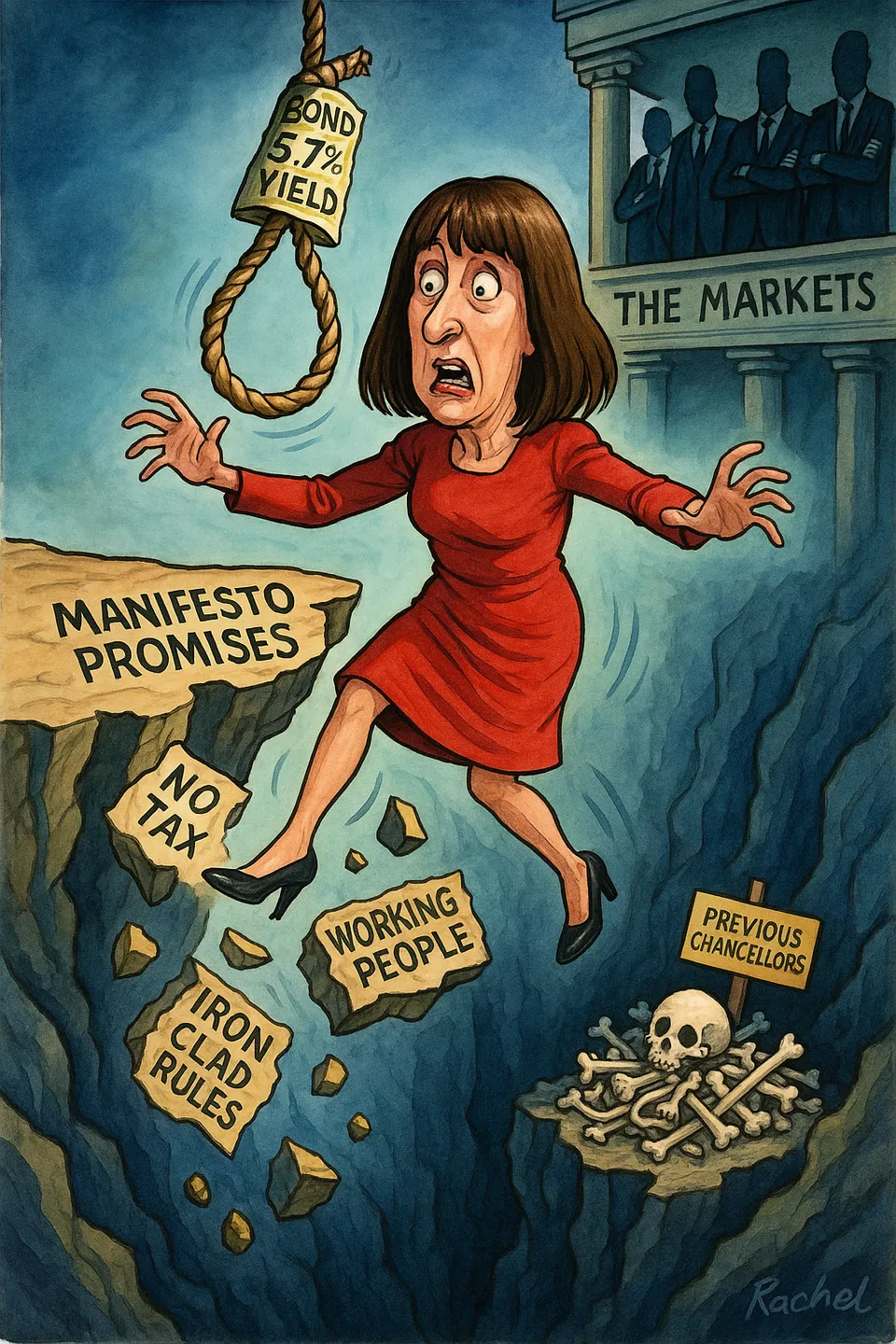The Fiscal Reckoning: When Electoral Promises Meet Economic Reality

The Cost of Political Ambition in the UK's Economic Strategy is Becoming Clear
As the UK grapples with soaring borrowing costs and fiscal pressures, the gap between political promises and economic realities has never been more pronounced. Rachel Reeves is now faced with the challenge of reconciling these conflicting demands. This analysis delves into the implications for Labour's agenda and the broader political landscape.
While Labour campaigned on protecting “working people” from tax rises, financial markets have delivered their verdict on that promise. UK government borrowing costs have reached their highest level in 27 years, forcing Chancellor Rachel Reeves toward the tax increases she explicitly ruled out just months ago.
What Actually Happened
The yield on 30-year government bonds jumped to 5.72% on Tuesday—the highest since 1998. The pound fell to $1.3388, its weakest level against the dollar since August. These movements reflect investor scepticism about the government’s ability to control public finances without breaking its pre-election commitments.
Reeves faces a stark arithmetic problem. Her fiscal buffer stands at just £10 billion—a margin so thin that rising borrowing costs alone could breach her self-imposed rules. Economists estimate she needs to raise between £18 billion and £28 billion in the upcoming Budget to maintain fiscal credibility.
The government has already begun tactical retreats. Income tax threshold freezes—effectively stealth tax rises—are reportedly under consideration beyond 2028. Property tax reforms are being discussed. The very tax categories Labour promised to protect are now in the crosshairs.
The Pattern of Institutional Failure
This crisis exemplifies a recurring dysfunction in British politics: the gap between electoral positioning and governing reality. Labour’s manifesto promises were crafted for political advantage, not fiscal sustainability. The party committed to massive spending increases while ruling out the revenue sources needed to fund them.
This isn’t partisan failure—it’s systemic failure. Conservative governments made similar unrealistic commitments throughout their tenure. The pattern persists: politicians promise what voters want to hear, then discover that economic gravity remains unchanged once in office.
The markets’ response reveals something uncomfortable about British democracy. Investor confidence matters more than electoral mandates. Bond traders in London and New York effectively have veto power over domestic policy, regardless of what voters were promised.
The Competence Deficit
Reeves inherited challenging fiscal circumstances, but her response demonstrates the persistent competence gap in British government. Setting fiscal rules with only a £10 billion buffer showed either naivety about economic volatility or cynical awareness that the rules would need breaking.
The government’s recent reshuffle—bringing in Darren Jones and Baroness Shafik—signals belated recognition of their economic inexperience. But personnel changes cannot resolve the fundamental contradiction between Labour’s spending ambitions and revenue constraints.
Meanwhile, the Opposition’s response proves equally hollow. Shadow Chancellor Mel Stride denounces Labour’s “economic disaster” while conveniently ignoring that Conservative mismanagement created these fiscal pressures. Neither party offers serious solutions—only competing versions of denial.
The Reality for Citizens
Behind the Treasury’s fiscal arithmetic lies a simple truth: ordinary workers will pay for political promises they were explicitly told they wouldn’t fund. The “working people” Labour pledged to protect will face higher taxes through stealth measures and indirect levies.
Mortgage holders already face rising borrowing costs as government bond yields feed through to commercial rates. Small businesses will encounter tighter credit conditions. Public services will receive less investment as debt servicing costs consume greater shares of government budgets.
The government’s current position—maintaining that fiscal rules remain “iron-clad” while preparing tax increases—insults public intelligence. Citizens deserve honesty about trade-offs, not theatrical commitment to unsustainable promises.
Documenting Decline
This episode captures broader themes of British institutional decay. Political parties make commitments they cannot honour. Civil servants fail to provide realistic assessments of policy costs. Markets impose discipline that democratic processes cannot deliver. Public discourse remains trapped in wishful thinking rather than honest assessment of constraints.
The Treasury’s £10 billion buffer represents more than fiscal miscalculation—it symbolises the gap between serious governance and political theatre. Competent institutions would maintain larger margins for economic volatility. Honest politicians would explain trade-offs rather than making impossible promises.
Instead, Britain continues its established pattern: electoral campaigns based on fantasy, governance shaped by crisis management, and citizens bearing costs they were promised they would avoid. The decline continues, measured now in basis points and bond yields—the cold mathematics of institutional failure.
The markets have spoken. The only question remaining is which taxes Reeves will raise, and how she will explain breaking promises that were never sustainable to begin with.
Commentary based on UK borrowing costs hit 27-year high adding to pressure on Reeves by Tom Espiner & Nick Edser on BBC News.